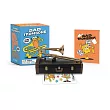In The Lost Art of Ironing, the metaphorical iron smooths out life’s creases as well as crumpled clothes, with poems about women as lovers, wives, mothers, muses, and editors and curators of their own lives.
Kelly Davis gives us meditations on other writers, including playful new perspectives on famous poems by Eliot and Keats. She considers being Emily Dickinson’s best friend and recalls the intoxicating experience of reading Anne Sexton’s poetry for the first time. She imagines George Sand and her lover Frédéric Chopin on an ill-fated holiday and listens in to the thoughts of Lisa Gherardini (better known as ’the Mona Lisa’). She also writes, with warmth and honesty, about her family and the small West Cumbrian town where she lives. The collection ends with five modern versions of Shakespeare’s best-loved sonnets, looking at time, love and mortality in the digital age, where anyone can create the illusion of eternal youth.
These poems sparkle with wit and wisdom and shed new light on the way women’s lives have changed - and not changed.
My mother-in-law lived through the war
and ironed everything - dishcloths, towels, underpants,
every bit of fabric in the house.
She couldn’t talk about her feelings
but she ironed beautifully. Her children knew she loved them
because their sheets were always smooth as glass.
"Here is a true poet. No game playing, no showing off, no trying to impress. These poems go straight to the heart of what it means to be alive in the day-to-day world most of us occupy. I’m amazed this is her first collection."
"A sensitive and assured collection. Kelly Davis reflects on many aspects of her life and family history in tones that range from sorrow through wistfulness to wry humour. Her poems are both wise and probing. She anchors her reflections firmly in the real world, an accurate observer who can see poetic potential in humdrum subject-matter. Her poems might be placed in a tradition coming down to her through Heaney, but she surprises the reader with her fresh insights. She is fully in charge of her craft throughout, using free verse and fixed forms to equally good effect. She has a knack for choosing which forms will best suit her concerns, which range widely. It is particularly unusual (and uplifting) to find a contemporary poet who handles the sonnet form so well. This is a book to treasure and return to; each re-reading will yield new enjoyment."
"This collection offers the accumulated riches of a life well lived. ’To My Hands’ provides an autobiographical framework; other poems sketch family history, sometimes tragic. But the heart of this book is celebration. ’The Big Room’ is worthy of a place where jigs were danced and Christmases were celebrated. ’But now it’s mainly just the two of us / reading quietly in armchairs on either side of the hearth.’ The celebration extends to Maryport where this house is located, which has seen better days but has ’the best bloody sunsets in England.’ Yea! There is so much to enjoy here."



 天天爆殺
天天爆殺  今日66折
今日66折 
























 博客來
博客來 博客來
博客來 博客來
博客來 博客來
博客來 博客來
博客來